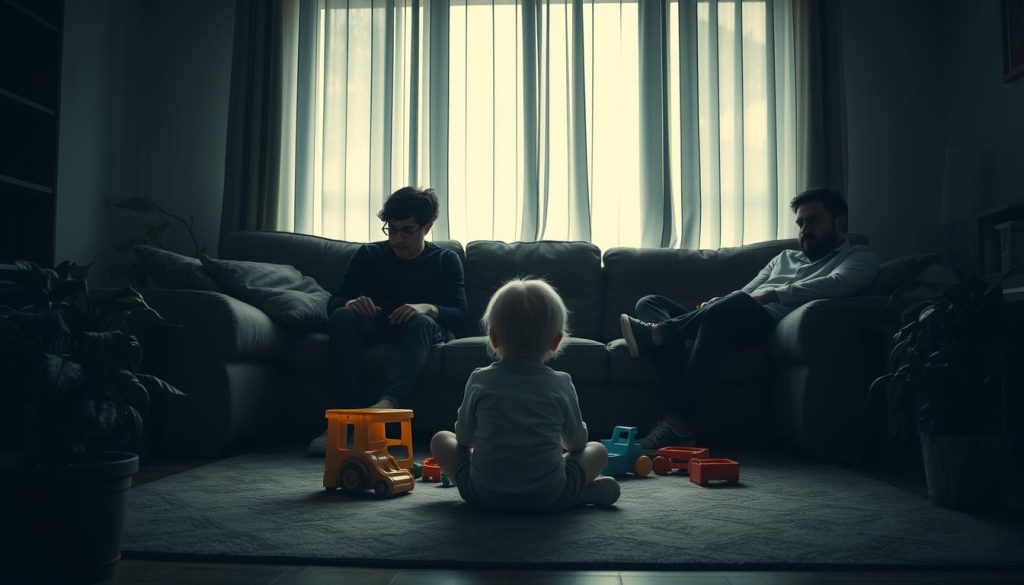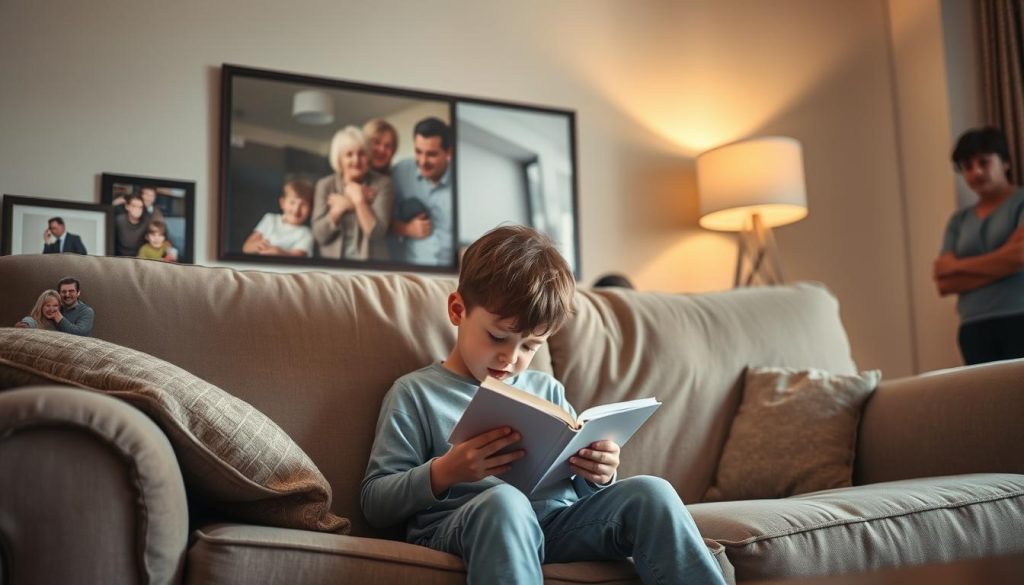How can depression, a common mental health issue, break a family apart? It affects about 21 million adults in the U.S. alone. This can strain relationships, disrupt communication, and cause social isolation. It’s key to address these issues to keep family harmony and support recovery.
Depression doesn’t just affect the person who has it; it impacts the whole family. It can lead to emotional strain, communication problems, and social isolation. There are treatments like therapy and medication. It’s important to support a loved one with depression.
Learning about depression’s signs and symptoms is crucial for families. This knowledge helps them take action. Online family therapy is especially important for dealing with issues like sibling rivalry and managing family budgeting. Organizations like the American Psychological Association and the National Alliance on Mental Illness provide valuable resources.
Key Takeaways
- Recognize the emotional toll depression takes on family dynamics.
- Understand the signs of depression, including behavioral changes and physical symptoms.
- Acknowledge the impact of depression on different family members, particularly spouses, partners, children, and teens.
- Utilize new approaches like online family therapy to address issues related to sibling rivalry and family budgeting.
- Leverage professional resources like the American Psychological Association for support and guidance.
The Impact of Depression on Family Relationships
Depression can really strain family relationships. It leads to emotional issues, communication problems, and feeling left out. In the U.S., many families face these challenges. It’s key to understand how depression affects families to keep relationships strong.
Gentle parenting can help a lot. It offers a caring way to deal with these tough feelings.
Emotional Strain
Depression can make a family’s mood very tense. It can make people feel distant from each other. This distance can make things worse, affecting how parents and kids feel about themselves.
Talking openly about puberty and feelings can help. It creates a safe space for everyone to share and support each other.
Communication Breakdown
Depression makes it hard for people to talk openly. This can lead to misunderstandings and hurt feelings. Setting clear boundaries and managing money well can help.
Having a stable financial situation is important. It helps keep the family’s mood better and reduces stress.
Social Isolation
Depression can make people feel like staying away from others. Family members might stop going out or feel too ashamed. Kids might pull back from friends or act out.
It’s important to watch how kids use social media. They might turn to it as a way to cope. Encouraging family time and seeking help can make a big difference.

Recognizing the Signs of Depression in Loved Ones

Spotting depression in loved ones means looking for both behavioral changes and physical symptoms. Depression hits 21 million adults and five million teens in the U.S. every year. Families are key in spotting these signs and offering support, similar to dealing with middle child syndrome or the effects of divorce on kids. Catching it early can stop it from getting worse.
Behavioral Changes
Behavioral changes are clear signs of depression. You might see someone pull back from friends, ignore their looks, or eat differently. They might sleep too much or too little, showing signs like middle child syndrome. They might talk less or seem less excited about things they used to love. This is similar to how you watch for changes in kids when talking about drugs.
Physical Symptoms
Depression can also show in physical ways, like unexplained pain, big weight changes, or feeling very tired. Weight changes are often one of the first signs, with someone gaining or losing a lot quickly. Like eco-friendly parenting focuses on health, taking care of someone with these symptoms is crucial. Spotting these signs early is key to helping, which can include medicine, therapy, or both.
How Depression Affects Different Family Members
Depression affects families in many ways, impacting spouses, partners, children, and teens. In the U.S., about 7.5 million parents deal with depression each year. This puts around 15 million kids at risk for health problems. It’s key to understand how depression affects each family member to help everyone.
Spouses and Partners
Spouses and partners often carry the emotional weight, leading to strained relationships and burnout. They face extra stress and emotional challenges from supporting a depressed partner. This can worsen existing problems, like those in stepchild relationships or after remarriage.
Without the right help and support, it’s hard for partners to get the assistance they need.

Children and Teens
Depression in a parent can harm children and teens, raising their risk of mental and behavioral issues. Kids of depressed parents are three times more likely to become depressed themselves. If a parent got depression before 20, a child’s risk goes up four to five times.
These kids might also feel bad about themselves and struggle with body positivity. They may act out or withdraw socially, especially if family communication is poor.
Getting kids involved in sports can help them feel better. But, it’s crucial for the whole family to focus on mental health. This ensures kids get the support they need to do well.
Role of Parenting Challenges in Families Dealing with Depression
When a family member has depression, it brings big challenges for parents. It can hurt children’s mental health, leading to eating disorders, anxiety, and sibling fights. In the U.S., 21 million adults have had a major depressive episode, showing how common it is.
Parents with depression might find it hard to connect with their kids. This can make parenting seem harsh and distant. Kids might act out, have trouble attaching, or do poorly in school. It’s key to use good parenting tips to help the family stay strong.
Children of depressed parents often have to grow up too fast. They take on too much responsibility. This can mess with their emotional and social growth. Mental health issues in parents can harm children’s well-being even more.
It’s important for parents to get help and talk openly with their family. Using eco-friendly and gentle parenting can also help. This way, parents can create a caring home for their kids.
Handling depression in a family needs a team effort. This includes getting professional help, being mindful parents, and using resources like the National Suicide Prevention Lifeline (1-800-273-8255). By tackling these issues, parents can protect their kids’ mental health and build a supportive home.
FAQ
How can depression lead to emotional strain in family relationships?
What are common causes of communication breakdowns in families dealing with depression?
How does social isolation affect families dealing with depression?
What behavioral changes should I look for in a loved one to identify possible depression?
Are there physical symptoms that indicate a family member might be depressed?
How does depression differentially affect spouses and partners?
What impact does a parent’s depression have on children and teens?
What parenting challenges arise in families dealing with depression?
How can families create a less stressful environment for a depressed loved one?
What resources are available for families dealing with depression?
This post contains affiliate links. If you click on a link and make a purchase, I may earn a small commission — at no extra cost to you. Thank you for supporting this blog and helping me keep the patterns free! Read the full Affiliate Disclosure & Transparency.
